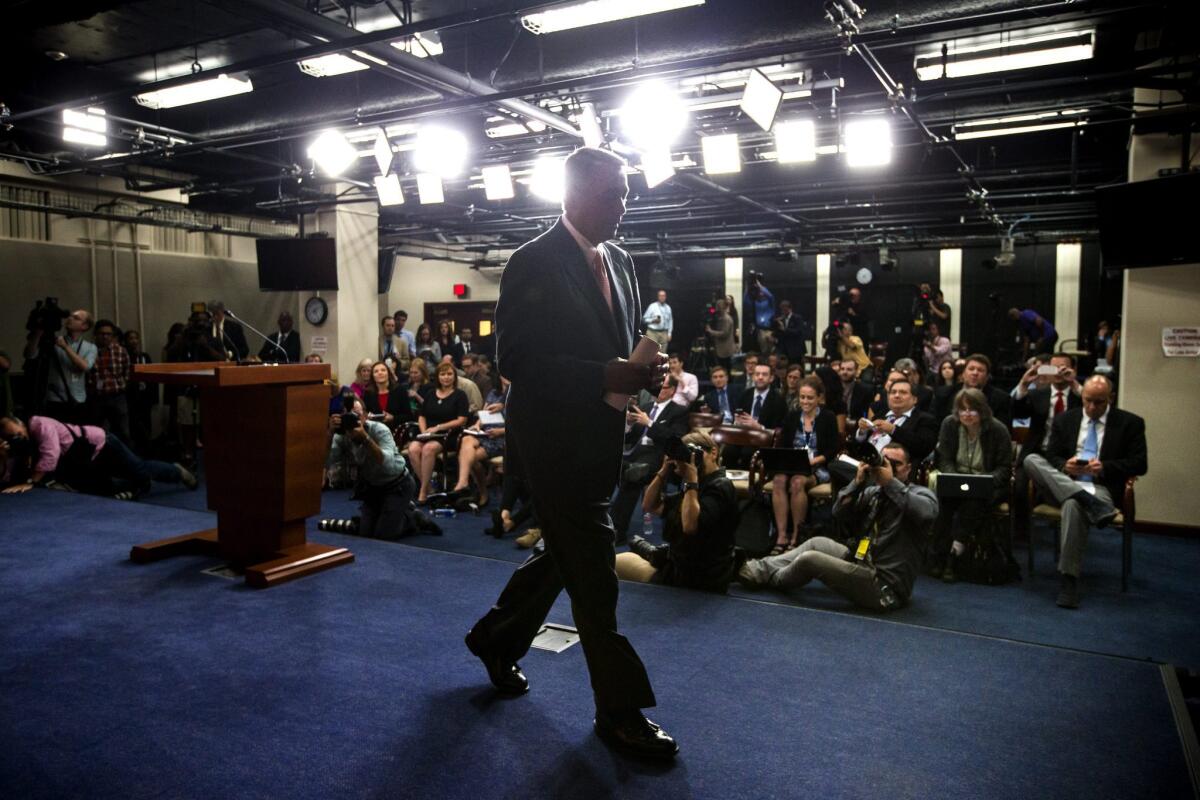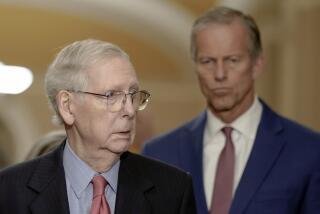Column: Boehner heard the pope’s message, but did GOP hard-liners?

Republican Speaker of the House from Ohio John Boehner walks away from the podium after announcing that he is retiring from Congress, on Sept. 25.
House Speaker John A. Boehner’s sudden decision to resign Friday came as a thunderclap in Washington, but it shouldn’t have surprised anyone who witnessed Boehner’s frustration grow with his fractious Republican caucus.
“Here’s the attitude,” he complained last year after conservatives blocked his fitful attempts to move immigration reform bills forward. “Ohhhh, don’t make me do this. Ohhhh, this is too hard… We get elected to solve problems, and it’s remarkable to me how many of my colleagues just don’t want to.”
“It does pain me to be described as spineless or a squish,” he said in January, after 25 conservatives voted against him as speaker. “What pains me the most is when they describe me as the establishment…. I’m the most anti-establishment speaker we’ve ever had.”
When a Politico reporter asked last month how he endured constant sniping from his own party, Boehner said: “Garbage men get used to the smell of bad garbage. Prisoners learn how to become prisoners.”
This was not a man who was enjoying his job — even though it is, at least in theory, the most powerful position in Congress.
Boehner was always a conservative, not a squish. But he also wanted to get things done, and for his first four years as speaker that meant working with a Democratic Senate leader and a Democratic president. The insurgent conservatives who gave him his majority never accepted that logic — and still don’t.
This year, Boehner hoped that the arrival of a GOP majority in the Senate would inspire pragmatism and cohesion in the House. Instead, it produced what political scientists call the curse of a big majority: With all those votes to spare, GOP hard-liners saw less need to compromise than ever. They demanded an end to federal funding for Planned Parenthood and said they were willing to risk another government shutdown to do it. When Boehner, a lifelong antiabortion crusader, disagreed with their strategy, they launched an effort to remove him from the speaker’s chair. That was the needless fight Boehner said he was leaving to avoid.
The irony, of course, is that Boehner and his lieutenants — including his most likely successor as speaker, Rep. Kevin McCarthy (R-Bakersfield) — helped many of those hard-liners get elected. But they created a monster they could not control, and they never got much loyalty in return.
The new conservatives didn’t want to make compromises, not even compromises that would secure the deep spending cuts they sought. Instead, they wanted to cleanse their party’s leadership of its remaining pragmatists, a label that, for some, included Boehner.
Their rebellions turned into a recurring melodrama.
In 2011, they blocked the speaker’s attempt to negotiate a “grand bargain” with President Obama that would have combined spending cuts with tax increases. In 2012, they rejected a Boehner proposal to raise taxes on incomes over $1 million; when a bipartisan coalition then passed a tax increase on incomes over $250,000 to avoid the fiscal cliff, the hard-liners blamed Boehner for backing down.
In 2013, they demanded a government shutdown in a kamikaze attempt to repeal Obama’s healthcare law. This time, Boehner let them have their way, in the hope that they might learn a lesson. The 13-day shutdown was a disaster, driving the GOP’s stature to record lows. But among the hard-liners, few lessons were learned — hence this year’s fight over Planned Parenthood.
Boehner said he hoped his resignation could serve as “a unifying moment” for the GOP and help avert more needless collisions. There’s not much chance of that; the House hard-liners’ crusade is far from complete. “Our constituents sent us here to fight,” said Rep. Matt Salmon (R-Ariz.), one of the leaders of the Freedom Caucus that harried Boehner.
And they’re abetted by presidential candidates who are bent on stoking conservative anger. Sen. Ted Cruz (R-Texas) said he had heard “reports” that Boehner “has cut a deal with Nancy Pelosi to fund the Obama administration for the rest of its tenure, to fund Obamacare, to fund executive amnesty, to fund Planned Parenthood, to fund implementation of this Iran deal — and then, presumably, to land in a cushy K Street job.”
So it’s no wonder that when Boehner announced his decision to leave Congress, he sounded like a man freed from a painful burden.
“Zip-a-dee-doo-dah, zip-a-dee-ay,” he told a news conference. “My oh my, what a wonderful day.”
He said his move wasn’t influenced by Pope Francis’ speech to Congress on Thursday. But it did seem as if the pontiff influenced his timing. Boehner’s announcement came only hours after he heard the pope deliver a pastoral challenge to the politicians in the House chamber.
“Your own responsibility as members of Congress is to enable this country, by your legislative activity, to grow as a nation,” Francis said. “A good political leader is one who, with the interest of all in mind, seizes the moment in a spirit of openness and pragmatism.”
John Boehner was clearly listening. Were any of his colleagues?
Twitter: @doylemcmanus
Follow the Opinion section on Twitter @latimesopinion and Facebook
More to Read
A cure for the common opinion
Get thought-provoking perspectives with our weekly newsletter.
You may occasionally receive promotional content from the Los Angeles Times.







